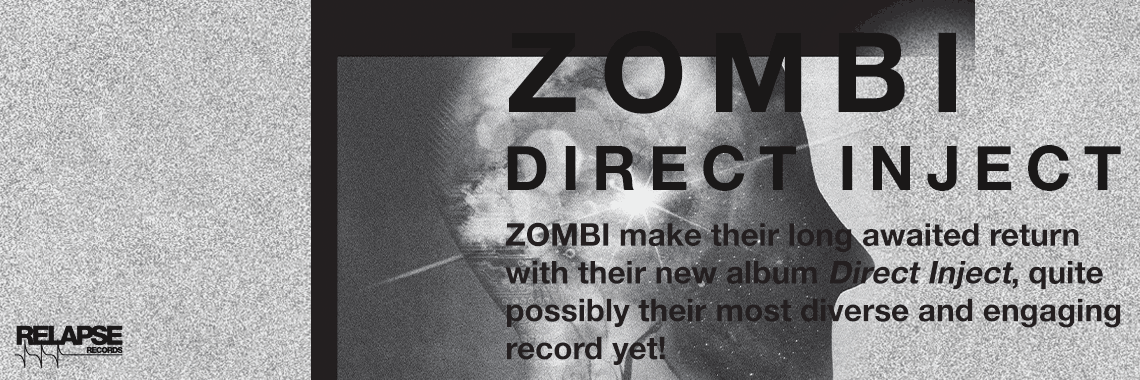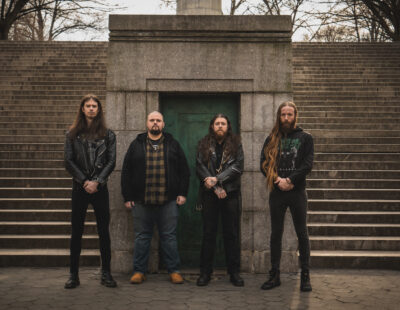Extreme metal fans complaining about the “lack of darkness” on an album with more than its share of shade have a severely skewed opinion of what constitutes “dark” music. But that’s completely understandable. After all, when you subsist on a diet of nothing but barbecue and someone hands you a salad, you’re going to wonder just what in the hell you’ve been given. “Yo goober! Where’s the meat?” So you can imagine the mild uproar from some metal listeners upon hearing the decidedly leafy fourth album by Alcest, which sidesteps all traces of metal entirely in an earnest attempt to create something closer to the vision of singer-songwriter Stephane “Neige” Paut rather than cater to one specific pocket of listeners.
Indeed, the mindset on Alcest’s Shelter (Prophecy) is bold, with Neige and Sigur Ros producer Birgir Jon Birgisson venturing full-bore into dreampop and shoegaze more than ever before, but such a move is hardly a surprise for those who have heard Alcest’s revelatory 2007 album Souvenirs d’un Autre Monde. In the wake of a pair of albums that saw Neige dipping more into his black metal past, though, it might have sent a message to some neophyte listeners that this project, which is intentionally devoid of genre, will always be rooted in black metal. So the consternation about how there’s such a lack of severe contrast between shimmering light and pitch blackness on the new record (“aural analgesic” is how Pitchfork’s damning-with-faint-praise review put it) is more a result of misguided expectations than a lucid understanding of what makes Alcest Alcest. It’s not so much about the lack of a dynamic interplay between light and shade – au contraire, as much of the album incorporates plenty of shade after the sunny early track “Opale” – than a much more interesting issue that’s afoot, one that audiences, be they metal, indie, or what have you, are often faced with.
I’ve had a bit of a tradition in my Decibel reviews of Alcest albums where I’d lead in with a line from Allen Ginsberg’s “Wales Visitation”, partially because I’m prone to florid, Ted Mosby-esque flights of pretension, but mostly because when I hear Alcest’s music, that’s what immediately springs to mind: heaven balanced on a grassblade, a solid mist-infused mass of heaven, wavelets of immensity. But whom I should have been quoting all along is William Blake, because the career arc of Alcest is looking more and more like a striking contrast between innocence and experience. And if there’s one thing worth debating about this band, it’s whether the acquired experience of Neige in the last seven years makes his music better than his far more innocent early work.
What was so fascinating about Alcest from the start was how it bore such an uncanny resemblance to the dreamier side of British shoegaze music – Slowdive and Ride, namely – yet Neige had never even heard those bands when he wrote and recorded the debut Le Secret EP and Souvenirs d’un Autre Monde. It was such a “happy accident”, so totally unintentional, that its charm was not unlike that of outsider music. And from a metal perspective, it sort of was outsider music. The way he just stumbled on to that sound was adorable. Innocence was all over those records, especially Souvenirs, both thematically and compositionally, and therein laid its great appeal. After being bombarded with questions about shoegaze and dreampop (“Have you even heard My Bloody Valentine?” we writers asked time and again), he discovered the incredible world of late-‘80s/early-‘90s 4AD Records, the likes of Slowdive and Cocteau Twins became major influences, and subsequent albums started to feel more structured, to the point where on 2011’s Les Voyages de l’Ame you could hear the musical references, both black metal and shoegaze/dreampop, more vividly.
Shelter, meanwhile, is the full realization of the “experience” side. Everything about the record, from the glockenspiel on “Opale”, to the startlingly sober and somber guest appearance by Slowdive founder Neil Halstead, to the overt Sigur Ros references on the soaring “Delivrance”, is deliberate, professional, mature. Although the connection between Souvenirs and Shelter is more than obvious, with their focus on pastoral, lilting sounds devoid of any severity, the confidence of Shelter actually rids Alcest of that intangible, naive quality that made Souvenirs so endearing. In the end, that’s the big issue here, not the foolish complaint that dreampop requires extreme sounds to balance it. The beauty of the album is undeniable – “La Nuit Marche Avec Moi”, “Voix Sireines”, and the title track rank among Neige’s most gorgeous compositions – and it bears all the most important melodic characteristics of Alcest, but the composition and execution is more worldly now, more advanced. It’s the same, but decidedly different too, and whether you like this album depends wholly on whether or not you’re willing to let that innocence recede into the past.
Obviously, this is in no way a metal album, but seeing how Neige owes his success to metal fans and media, who were the only ones who gave a damn about his music in the first place, this album is still relevant a good number of metal fans, which is why I’m leading off with this review. However, with Neige going out of his way to backhandedly alienate the extreme metal crowd (he was merciless when I interviewed him last month) that break from metal looks like it’ll be a clean one, as he seeks an audience much broader than the one he already has. Which is fine, Alcest’s music has always had a universal quality, the “metal” tag has kept potential new listeners away by mere association, and Shelter fully deserves crossover success. It will, though, risk coming at the cost of the support of the metal crowd, those who subsist on barbecue and say that you don’t win friends with salad. With a marvelous new album under his belt, it’s a gamble Neige is willing to take, as he sets off, bottle of vinaigrette in hand and Blake in his head, wishing to lead others when they should be led.
***
And there’s the Blake reference. I’m awful. All right, onwards and upwards. There is more than enough honest to goodness heavy metal to mention this week, including a couple that are absolutely worth investigating. With somewhere around 40 titles coming out, it’s impossible to provide informed opinions on them all, and I’ve set a new dozen-or-so limit for myself this year, just to keep my sanity in check, because I was going near batshit at the end of 2014. So please forgive me if I unintentionally miss the most über-kvlt underground record or intentionally skip the latest big thing in Revolver-centric children’s metal. I’ll try to keep this year’s Sucker For Punishment selections a good blend of stuff that’ll appeal to Decibel readers and reflect my own quirky tastes. As well as high profile crap that deserves to be shamed. I’m looking at you, Chrome Division.
Anyway, these two albums you absolutely need to check out, without hesitation:
Avichi, Catharsis Absolute (Profound Lore): Andrew Markuszewski is probably best known as a member of Chicago miscreants Lord Mantis – and as sporadic guitarist in the late Nachtmystium – but his work under the moniker Aamonael in the solo black metal project Avichi has always shown great potential. 2011’s The Devil’s Fractal was strong enough to very nearly make my list of the best metal albums that year, but the follow-up has an even better chance. Very much in keeping with what any aficionado would expect from underground US black metal, heavy on atmospherics, repetition, and moments of chaotic savagery, Catharsis Absolute branches out even more, utilizing melody to shockingly good effect, from the subtle gothic synths on “Lightweaver”, to the tortured ballad “All Gods Fall”, to the sparse piano compositions that bookend the album. In black metal especially, it’s crucial to not make any sort of experimentation feel forced, and Markuszewski succeeds mightily here, adding richness to an already multihued palette. Stream and purchase via Bandcamp.
Indian, From All Purity (Relapse): Chicago’s Indian have always been excellent at creating first-rate sludge/doom, but for some reason they’ve stepped things up on their fifth album in a way they’ve never quite done before. Not only is this music merciless in the way it assaults the listener, but these songs, molded into dense slabs of noise by the great Sanford Parker, are truly hostile and harrowing, whether on the ungodly “Rape” or the ferocious “Rhetoric of No”. They’ve outdone themselves with this record, and after nearly a decade of being somewhat overlooked, are poised for a year loaded with deserved accolades. Stream and purchase via Bandcamp.
Also out this week:
Chrome Division, Infernal Rock Eternal (Nuclear Blast): The Norwegian supergroup’s Motörhead shtick has been shelved for even more blatant imitations of Black Label Society and Five Finger Death Punch. This is terrible, embarrassing music, not to mention shameless pandering to the weekend biker crowd by Shagrath and company.
Crystal Viper, Possession (AFM): The Polish band’s ludicrous take on traditional heavy metal should in theory appeal to me, but the music always falls flat. Singer/guitarist Marta Gabriel howls maniacally yet again on this fifth album, but the melodies don’t engage the listener often enough, and if that wasn’t enough, writing a concept album while not having the best command of written English just makes everything needlessly awkward, which is hammered home by the scorching cover of Riot’s classic “Thundersteel”. Get thee a lyricist, please. Though I will say this line makes for a delightfully milquetoast denouement: “The Creator gives up and leaves the girl, annoyed that the human race is incapable of an intelligent conversation.”
Culted, Oblique To All Paths (Relapse): It’s unhealthy but inevitable, especially among Canadian metal writers, that a band that signs with a prominent record label will be on the receiving end of glowing critical praise more out of courtesy than simple objectivity. So pardon me while I be a bad Canadian and say that the latest album by Winnipeg-via-Sweden band Culted does absolutely nothing for me. Tedious, overlong, and as bone dry as a Manitoba winter, it attempts to fuse doom, black metal, and slight touches of industrial and noise, but the few times it does gel, are fleeting at best, making Daniel Jansson’s vocal contributions, by far the best thing about this record, seem wasted.
Drudkh/Winterfylleth, Thousands of Moons Ago/The Gates (Season Of Mist): It’s a Drudkh clearing house this week. This split with British pagan black metal greats Winterfylleth features all parties chipping in with covers, Drudkh tackling selections by Hefeystos, Unclean, and Sacrilegium, while their buddies cover a Hate Forest tune. It’s all done well enough, especially Winterfylleth’s reading of “The Gates”, but personally I’d much rather hear new original material from these highly talented bands.
Drudkh, Eastern Frontier In Flames (Season Of Mist): Okay, this is new, a compilation of Drudkh EPs, including the one they just released this week. Yes, all four of the Ukrainians’ tracks from the Winterfylleth split are on this one, as well as two more covers from 2010 and a pair of original compositions from 2007. This is asking a lot of Drudkh completists out there.
Iced Earth, Plagues Of Babylon (Century Media): The hiring of Stu Block as successor to the great singer Matt Barlow was the exact kind of adrenaline shot the flagging Iced Earth needed, as he and Jon Schaffer collaborated on 2011’s Dystopia, the band’s best album in a full decade. While nowhere near as tired as the Framing Armageddon albums, the follow-up is nevertheless a significant step down. It all boils down to anthemic hooks when it comes to Iced Earth, and there just aren’t enough here, whereas Dystopia was loaded with them. “Resistance”, “The End”, and “The Culling” are all above worthy tunes, and the formidable, powerful-voiced Block once again sells the material convincingly, but the rest of the record fails to measure up to Dystopia, which raised the bar considerably.
Murmur, Murmur (Season Of Mist): I love adventurousness in extreme metal, but this second album by the Chicago band is all over the place, rooted in black metal and oddly torn between progressive rock, noise, and jazz. Some of it does stick, as on the crazed, 11-minute “Al-Malik”, but there’s such a lack of focus that the band misses the point of an influence like King Crimson, whose “Larks’ Tongues in Aspic” is covered here in ironic yet otherwise superb fashion. If they want to hit an artistic level on par with Oranssi Pazuzu and Aluk Todolo, more discipline is needed.
Orchid, The Zodiac Sessions (Nuclear Blast): Two early releases by the San Francisco Sabbath disciples have been neatly repackaged and reissued as a stopgap release in the wake of last year’s excellent In the Mouths of Madness. Fans get the 2011 album Capricorn as well as 2009’s Through the Devil’s Doorway EP, both of which show just how on their game the band was that early on in their existence. If you liked last year’s album and haven’t heard these tracks yet, this is a no-brainer.
Scorpions, MTV Unplugged (Sony): Is this 1992? Scorpions seem to think so, as they performed an acoustic set of new songs and rearranged classics, complete with cameos by a couple German celebrities – and the guy from a-ha, of all people – and a string section in front of an adoring audience in Athens. It’s all very lavish and garish, and ballads like “In Trance” and “Still Loving You” work decently, but riff-oriented music like hard rock/heavy metal rarely benefits from acoustic treatments. “Rock You Like a Hurricane”, “Big City Nights”, “No One Like You”, and “Blackout” were never meant to be played on acoustic guitar, sorry.
Sister, Disguised Vultures (Metal Blade): No, this isn’t a reissue of long-lost recordings by Blackie Lawless’s old band. Sadly. But ‘80s-era Sunset Strip glam looms over this strangely interesting album by the Swedish band, which is laced with sleazy riffs reminiscent of early LA Guns. Annoyingly, the punk and black metal influences often get in the way as Sister tries to come off as a corpsepainted Turbonegro, but there are some catchy little tunes here such as “Sick” and “We Salute ‘Em”.






